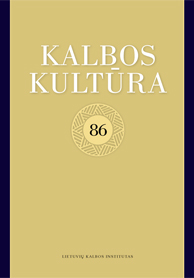ĮVARDŽIUOTINIAI DALYVIAI SU PRIKLAUSOMAIS ŽODŽIAIS: KODIFIKUOTOJI NORMA IR JOS NEAIŠKUMAI
PRONOMINAL PARTICIPLES WITH DEPENDENT WORDS: THE CODIFIED STANDARD AND UNCERTAINTIES SURROUNDING IT
Author(s): Ramunė VaskelaitėSubject(s): Theoretical Linguistics, Morphology, Syntax, Baltic Languages
Published by: Lietuvių Kalbos Institutas
Keywords: pronominal form; pronominal participle; pronominal adjective; dependent words; attribute; noun;
Summary/Abstract: The paper discusses the peculiar use of the pronominal form envisaged by Jonas Jablonskis: the pronominal form of the participle, as well as that of the adjective, shall not be used where that participle has dependent words. The uneven coverage of this criterion is revealed, which calls for discussing the issue of the analogical use of the pronominal form of participle and adjective. It turns out that some works of a research nature do indicate the analogy, yet at the same time they present peculiarities in the use of the pronominal form that cannot be applied to the participle; such context also makes unclear the issue of the application of the dependent words criterion to participles mentioned among those peculiarities. The issue of the application of this criterion to participles used as nouns is unclear in particular: while, in some works, the criterion is applied to participles used as nouns, the examples occurring in discussing the participle, and the formulations provided in the assessment of participles that turn into nouns or of participles used in the position of a noun in addition, nevertheless, show that the use of the participle in the position of the noun and the use of the adjective in the position of the noun do not quite match. This would be in line with the concept of participle, as a part of the language of verbal origin, characterised by the denotation of time and verbal government features. It is these differences between the adjective and the noun that the irregularities in the use of the pronominal form could be related to, confirmation of which would be the discussion of parts of the sentence provided in some descriptions of syntax composition. Those descriptions reveal that mentioning of some additional components of the subject, object or circumstantial adverb, or examples where the words governed by or contiguous with the participle function as such components, cannot be avoided.
Journal: Bendrinė kalba (iki 2014 metų – Kalbos kultūra)
- Issue Year: 2019
- Issue No: 92
- Page Range: 1-28
- Page Count: 28
- Language: Lithuanian

